Business Law Case Study Report: Contract and Frustration Analysis
VerifiedAdded on 2022/11/19
|10
|2360
|358
Report
AI Summary
This report presents an analysis of two case studies in Business Law, focusing on contract law principles. The first case examines a contract dispute involving a minor and the concept of consideration, concluding that the minor can be sued for breach of contract. The analysis explores the contractual capacity of minors, the presence of consideration, and the validity of the contract. The second case delves into the doctrine of frustration of contract, examining a situation where a fishing company's contract becomes impossible to perform due to the denial of licenses. The report applies legal rules, including the doctrine of frustration and relevant case precedents such as Taylor v Caldwell, to arrive at conclusions for each case using the IRAC (Issue, Rule, Application, Conclusion) method. The report also discusses the legal effects of frustration, including the termination of the contract and the potential for restitution, and the relevance of unforeseen events.
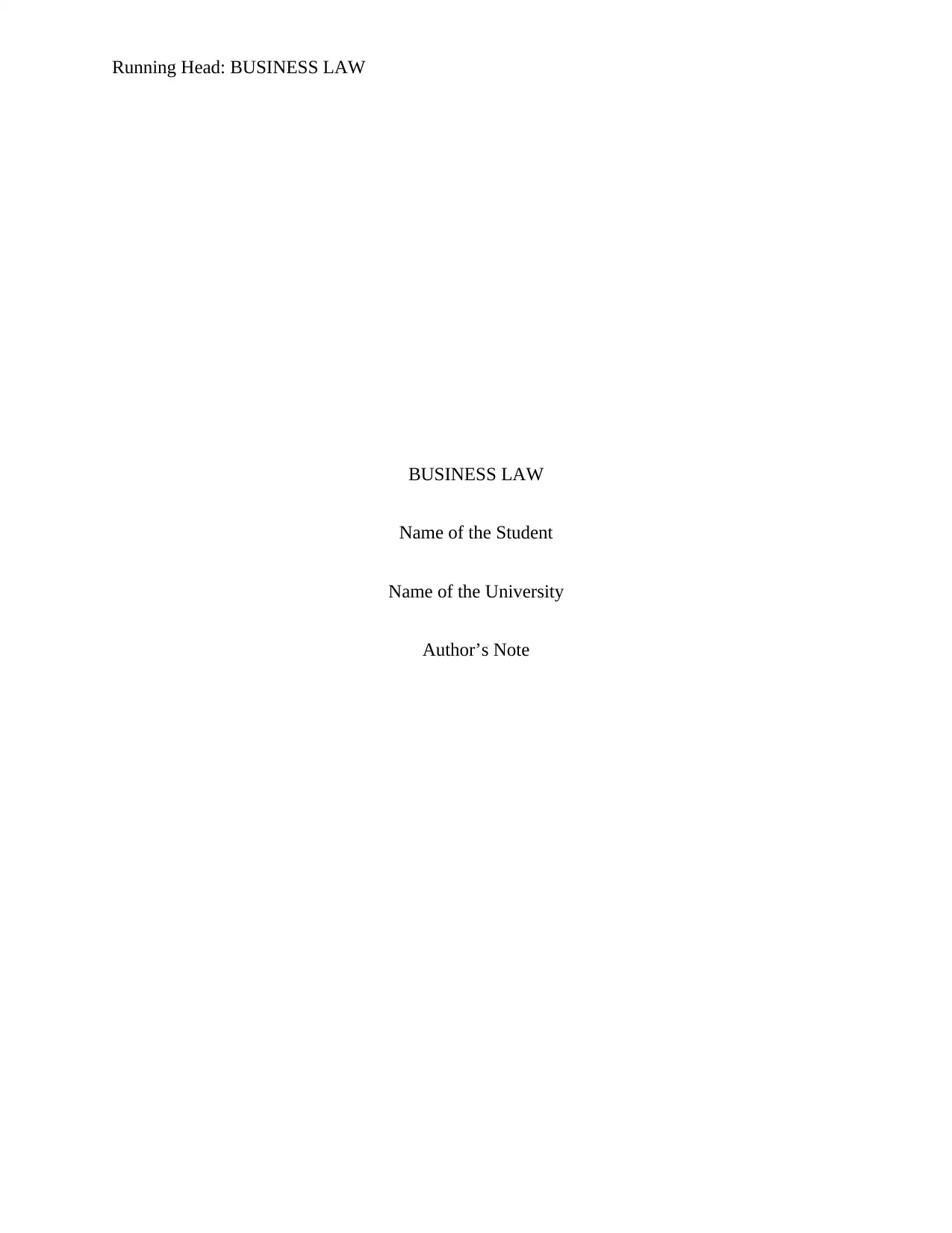
Running Head: BUSINESS LAW
BUSINESS LAW
Name of the Student
Name of the University
Author’s Note
BUSINESS LAW
Name of the Student
Name of the University
Author’s Note
Paraphrase This Document
Need a fresh take? Get an instant paraphrase of this document with our AI Paraphraser
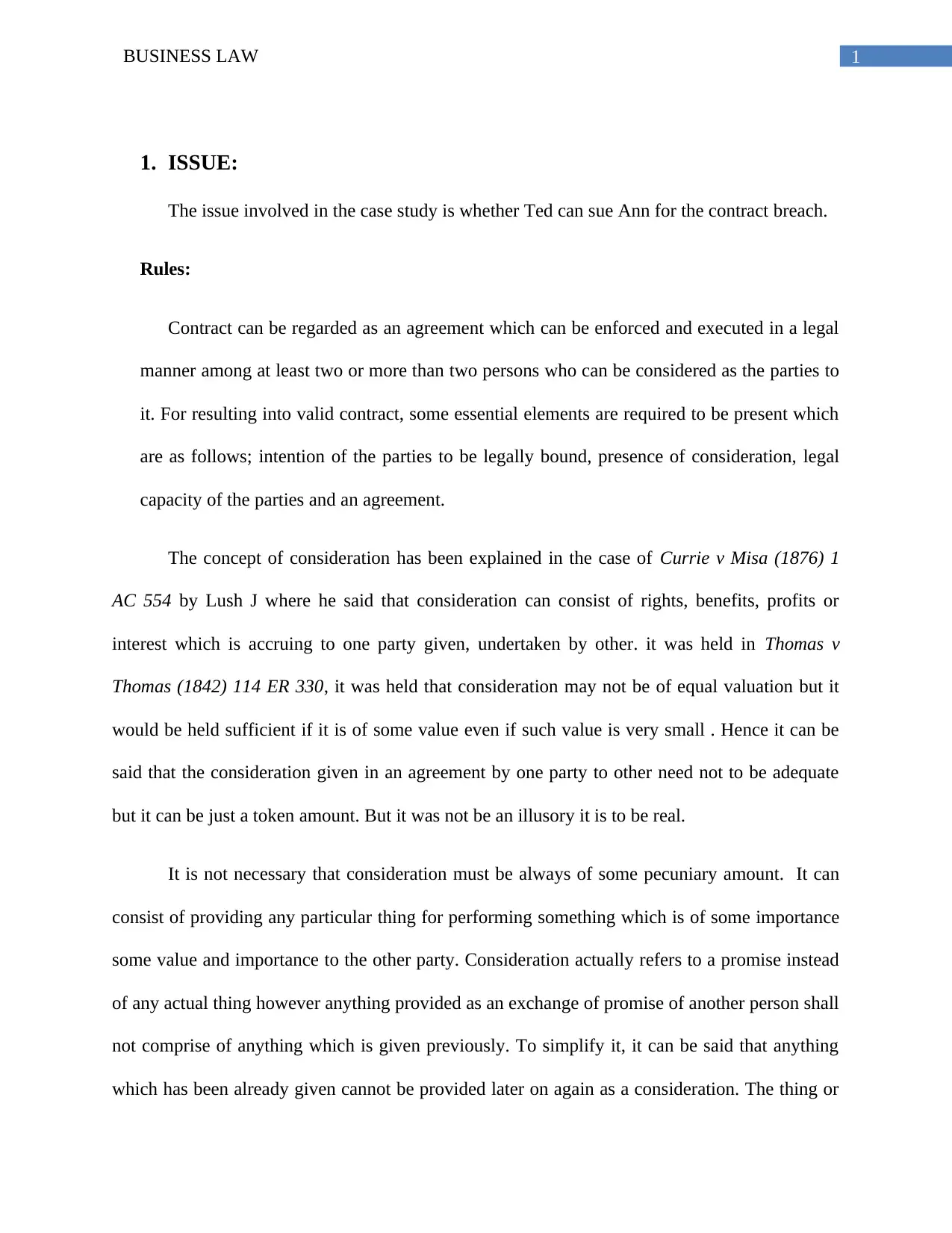
1BUSINESS LAW
1. ISSUE:
The issue involved in the case study is whether Ted can sue Ann for the contract breach.
Rules:
Contract can be regarded as an agreement which can be enforced and executed in a legal
manner among at least two or more than two persons who can be considered as the parties to
it. For resulting into valid contract, some essential elements are required to be present which
are as follows; intention of the parties to be legally bound, presence of consideration, legal
capacity of the parties and an agreement.
The concept of consideration has been explained in the case of Currie v Misa (1876) 1
AC 554 by Lush J where he said that consideration can consist of rights, benefits, profits or
interest which is accruing to one party given, undertaken by other. it was held in Thomas v
Thomas (1842) 114 ER 330, it was held that consideration may not be of equal valuation but it
would be held sufficient if it is of some value even if such value is very small . Hence it can be
said that the consideration given in an agreement by one party to other need not to be adequate
but it can be just a token amount. But it was not be an illusory it is to be real.
It is not necessary that consideration must be always of some pecuniary amount. It can
consist of providing any particular thing for performing something which is of some importance
some value and importance to the other party. Consideration actually refers to a promise instead
of any actual thing however anything provided as an exchange of promise of another person shall
not comprise of anything which is given previously. To simplify it, it can be said that anything
which has been already given cannot be provided later on again as a consideration. The thing or
1. ISSUE:
The issue involved in the case study is whether Ted can sue Ann for the contract breach.
Rules:
Contract can be regarded as an agreement which can be enforced and executed in a legal
manner among at least two or more than two persons who can be considered as the parties to
it. For resulting into valid contract, some essential elements are required to be present which
are as follows; intention of the parties to be legally bound, presence of consideration, legal
capacity of the parties and an agreement.
The concept of consideration has been explained in the case of Currie v Misa (1876) 1
AC 554 by Lush J where he said that consideration can consist of rights, benefits, profits or
interest which is accruing to one party given, undertaken by other. it was held in Thomas v
Thomas (1842) 114 ER 330, it was held that consideration may not be of equal valuation but it
would be held sufficient if it is of some value even if such value is very small . Hence it can be
said that the consideration given in an agreement by one party to other need not to be adequate
but it can be just a token amount. But it was not be an illusory it is to be real.
It is not necessary that consideration must be always of some pecuniary amount. It can
consist of providing any particular thing for performing something which is of some importance
some value and importance to the other party. Consideration actually refers to a promise instead
of any actual thing however anything provided as an exchange of promise of another person shall
not comprise of anything which is given previously. To simplify it, it can be said that anything
which has been already given cannot be provided later on again as a consideration. The thing or
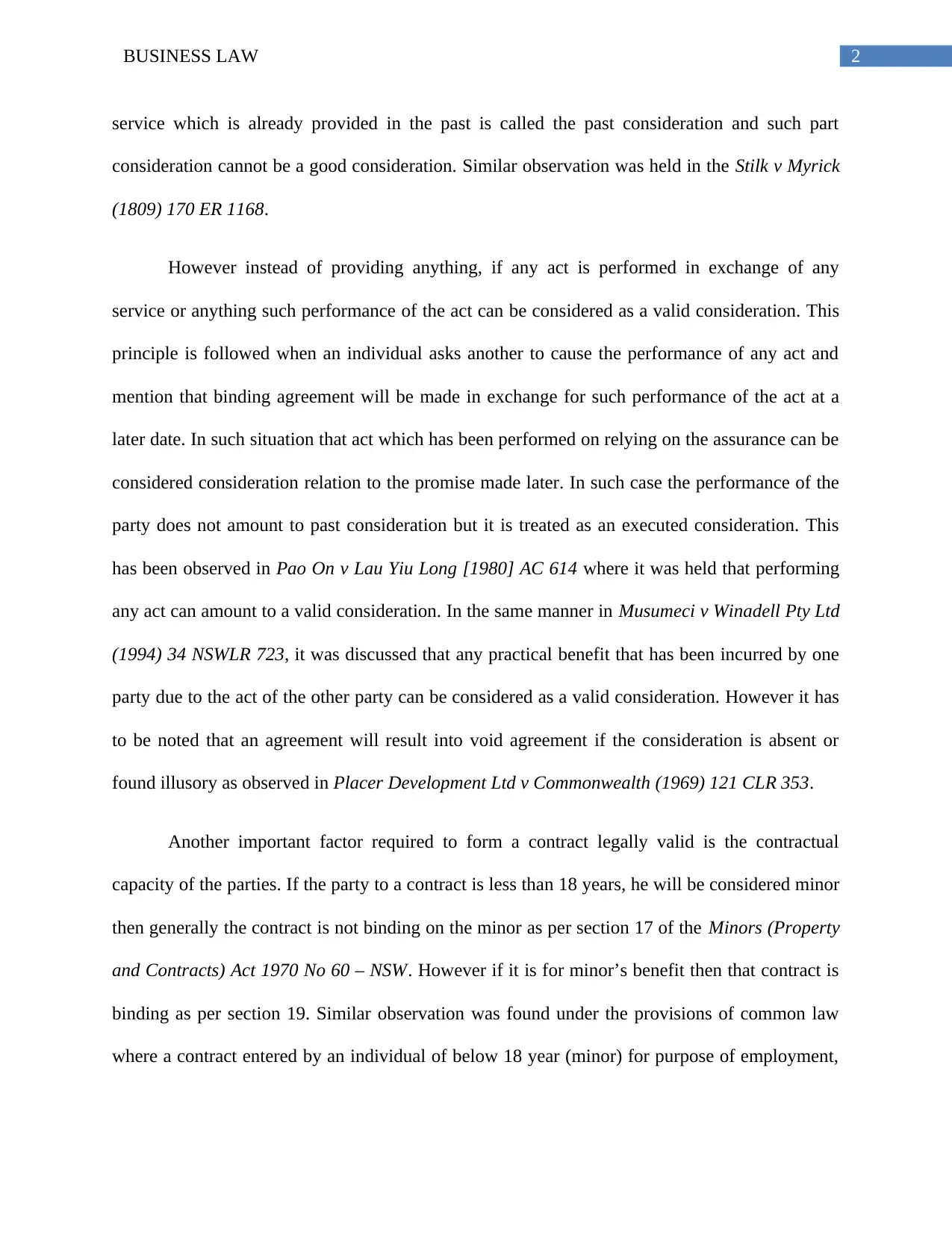
2BUSINESS LAW
service which is already provided in the past is called the past consideration and such part
consideration cannot be a good consideration. Similar observation was held in the Stilk v Myrick
(1809) 170 ER 1168.
However instead of providing anything, if any act is performed in exchange of any
service or anything such performance of the act can be considered as a valid consideration. This
principle is followed when an individual asks another to cause the performance of any act and
mention that binding agreement will be made in exchange for such performance of the act at a
later date. In such situation that act which has been performed on relying on the assurance can be
considered consideration relation to the promise made later. In such case the performance of the
party does not amount to past consideration but it is treated as an executed consideration. This
has been observed in Pao On v Lau Yiu Long [1980] AC 614 where it was held that performing
any act can amount to a valid consideration. In the same manner in Musumeci v Winadell Pty Ltd
(1994) 34 NSWLR 723, it was discussed that any practical benefit that has been incurred by one
party due to the act of the other party can be considered as a valid consideration. However it has
to be noted that an agreement will result into void agreement if the consideration is absent or
found illusory as observed in Placer Development Ltd v Commonwealth (1969) 121 CLR 353.
Another important factor required to form a contract legally valid is the contractual
capacity of the parties. If the party to a contract is less than 18 years, he will be considered minor
then generally the contract is not binding on the minor as per section 17 of the Minors (Property
and Contracts) Act 1970 No 60 – NSW. However if it is for minor’s benefit then that contract is
binding as per section 19. Similar observation was found under the provisions of common law
where a contract entered by an individual of below 18 year (minor) for purpose of employment,
service which is already provided in the past is called the past consideration and such part
consideration cannot be a good consideration. Similar observation was held in the Stilk v Myrick
(1809) 170 ER 1168.
However instead of providing anything, if any act is performed in exchange of any
service or anything such performance of the act can be considered as a valid consideration. This
principle is followed when an individual asks another to cause the performance of any act and
mention that binding agreement will be made in exchange for such performance of the act at a
later date. In such situation that act which has been performed on relying on the assurance can be
considered consideration relation to the promise made later. In such case the performance of the
party does not amount to past consideration but it is treated as an executed consideration. This
has been observed in Pao On v Lau Yiu Long [1980] AC 614 where it was held that performing
any act can amount to a valid consideration. In the same manner in Musumeci v Winadell Pty Ltd
(1994) 34 NSWLR 723, it was discussed that any practical benefit that has been incurred by one
party due to the act of the other party can be considered as a valid consideration. However it has
to be noted that an agreement will result into void agreement if the consideration is absent or
found illusory as observed in Placer Development Ltd v Commonwealth (1969) 121 CLR 353.
Another important factor required to form a contract legally valid is the contractual
capacity of the parties. If the party to a contract is less than 18 years, he will be considered minor
then generally the contract is not binding on the minor as per section 17 of the Minors (Property
and Contracts) Act 1970 No 60 – NSW. However if it is for minor’s benefit then that contract is
binding as per section 19. Similar observation was found under the provisions of common law
where a contract entered by an individual of below 18 year (minor) for purpose of employment,
⊘ This is a preview!⊘
Do you want full access?
Subscribe today to unlock all pages.

Trusted by 1+ million students worldwide
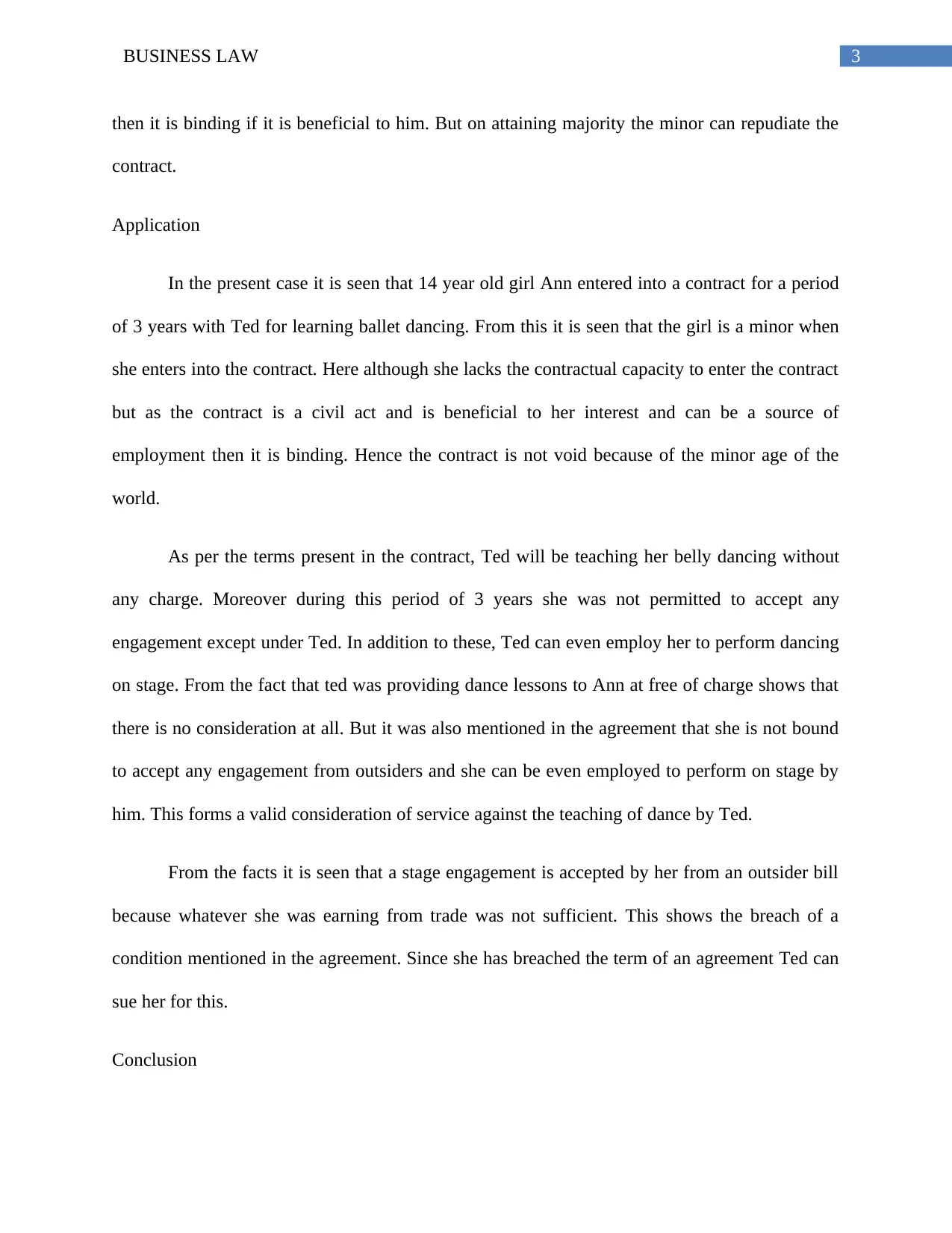
3BUSINESS LAW
then it is binding if it is beneficial to him. But on attaining majority the minor can repudiate the
contract.
Application
In the present case it is seen that 14 year old girl Ann entered into a contract for a period
of 3 years with Ted for learning ballet dancing. From this it is seen that the girl is a minor when
she enters into the contract. Here although she lacks the contractual capacity to enter the contract
but as the contract is a civil act and is beneficial to her interest and can be a source of
employment then it is binding. Hence the contract is not void because of the minor age of the
world.
As per the terms present in the contract, Ted will be teaching her belly dancing without
any charge. Moreover during this period of 3 years she was not permitted to accept any
engagement except under Ted. In addition to these, Ted can even employ her to perform dancing
on stage. From the fact that ted was providing dance lessons to Ann at free of charge shows that
there is no consideration at all. But it was also mentioned in the agreement that she is not bound
to accept any engagement from outsiders and she can be even employed to perform on stage by
him. This forms a valid consideration of service against the teaching of dance by Ted.
From the facts it is seen that a stage engagement is accepted by her from an outsider bill
because whatever she was earning from trade was not sufficient. This shows the breach of a
condition mentioned in the agreement. Since she has breached the term of an agreement Ted can
sue her for this.
Conclusion
then it is binding if it is beneficial to him. But on attaining majority the minor can repudiate the
contract.
Application
In the present case it is seen that 14 year old girl Ann entered into a contract for a period
of 3 years with Ted for learning ballet dancing. From this it is seen that the girl is a minor when
she enters into the contract. Here although she lacks the contractual capacity to enter the contract
but as the contract is a civil act and is beneficial to her interest and can be a source of
employment then it is binding. Hence the contract is not void because of the minor age of the
world.
As per the terms present in the contract, Ted will be teaching her belly dancing without
any charge. Moreover during this period of 3 years she was not permitted to accept any
engagement except under Ted. In addition to these, Ted can even employ her to perform dancing
on stage. From the fact that ted was providing dance lessons to Ann at free of charge shows that
there is no consideration at all. But it was also mentioned in the agreement that she is not bound
to accept any engagement from outsiders and she can be even employed to perform on stage by
him. This forms a valid consideration of service against the teaching of dance by Ted.
From the facts it is seen that a stage engagement is accepted by her from an outsider bill
because whatever she was earning from trade was not sufficient. This shows the breach of a
condition mentioned in the agreement. Since she has breached the term of an agreement Ted can
sue her for this.
Conclusion
Paraphrase This Document
Need a fresh take? Get an instant paraphrase of this document with our AI Paraphraser
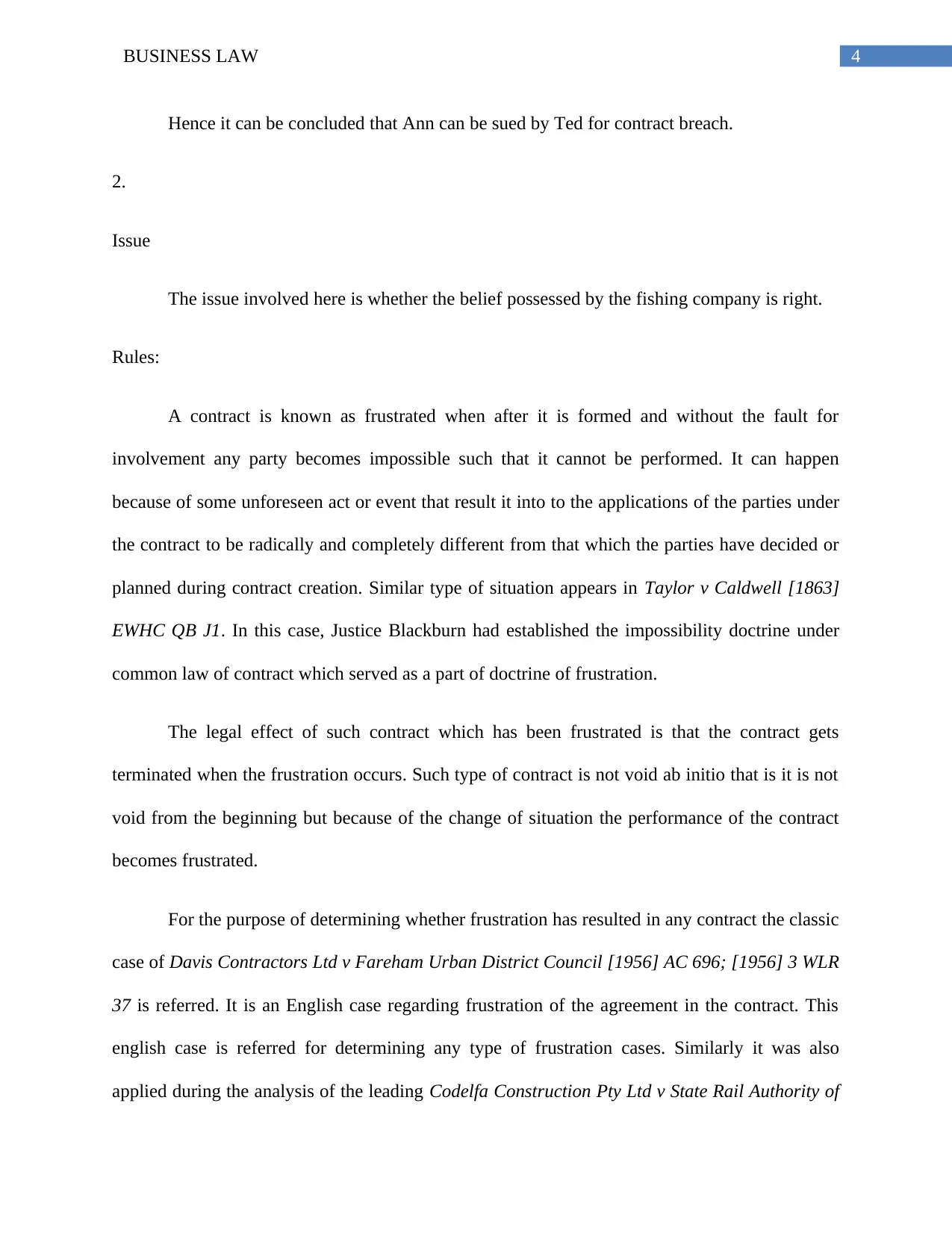
4BUSINESS LAW
Hence it can be concluded that Ann can be sued by Ted for contract breach.
2.
Issue
The issue involved here is whether the belief possessed by the fishing company is right.
Rules:
A contract is known as frustrated when after it is formed and without the fault for
involvement any party becomes impossible such that it cannot be performed. It can happen
because of some unforeseen act or event that result it into to the applications of the parties under
the contract to be radically and completely different from that which the parties have decided or
planned during contract creation. Similar type of situation appears in Taylor v Caldwell [1863]
EWHC QB J1. In this case, Justice Blackburn had established the impossibility doctrine under
common law of contract which served as a part of doctrine of frustration.
The legal effect of such contract which has been frustrated is that the contract gets
terminated when the frustration occurs. Such type of contract is not void ab initio that is it is not
void from the beginning but because of the change of situation the performance of the contract
becomes frustrated.
For the purpose of determining whether frustration has resulted in any contract the classic
case of Davis Contractors Ltd v Fareham Urban District Council [1956] AC 696; [1956] 3 WLR
37 is referred. It is an English case regarding frustration of the agreement in the contract. This
english case is referred for determining any type of frustration cases. Similarly it was also
applied during the analysis of the leading Codelfa Construction Pty Ltd v State Rail Authority of
Hence it can be concluded that Ann can be sued by Ted for contract breach.
2.
Issue
The issue involved here is whether the belief possessed by the fishing company is right.
Rules:
A contract is known as frustrated when after it is formed and without the fault for
involvement any party becomes impossible such that it cannot be performed. It can happen
because of some unforeseen act or event that result it into to the applications of the parties under
the contract to be radically and completely different from that which the parties have decided or
planned during contract creation. Similar type of situation appears in Taylor v Caldwell [1863]
EWHC QB J1. In this case, Justice Blackburn had established the impossibility doctrine under
common law of contract which served as a part of doctrine of frustration.
The legal effect of such contract which has been frustrated is that the contract gets
terminated when the frustration occurs. Such type of contract is not void ab initio that is it is not
void from the beginning but because of the change of situation the performance of the contract
becomes frustrated.
For the purpose of determining whether frustration has resulted in any contract the classic
case of Davis Contractors Ltd v Fareham Urban District Council [1956] AC 696; [1956] 3 WLR
37 is referred. It is an English case regarding frustration of the agreement in the contract. This
english case is referred for determining any type of frustration cases. Similarly it was also
applied during the analysis of the leading Codelfa Construction Pty Ltd v State Rail Authority of
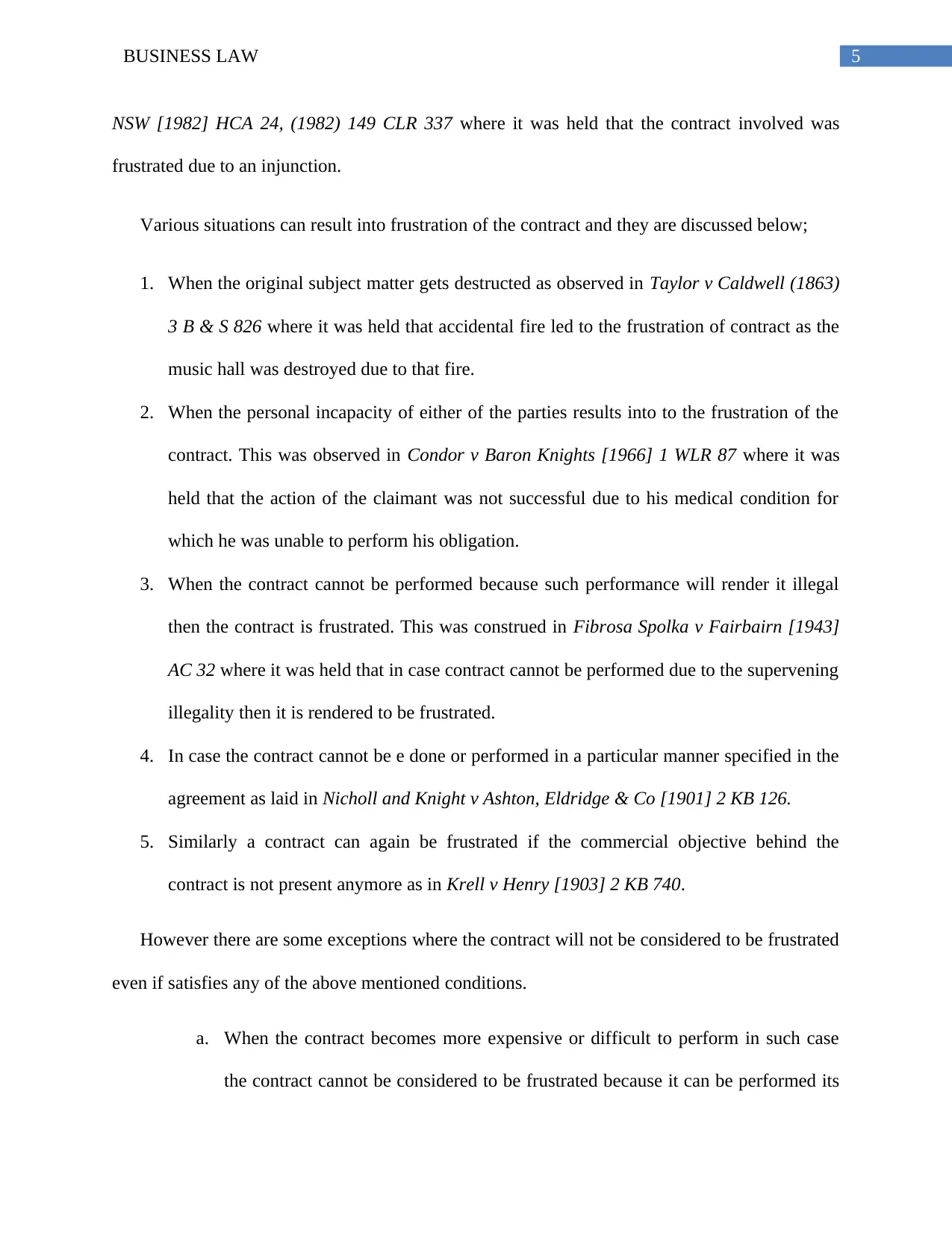
5BUSINESS LAW
NSW [1982] HCA 24, (1982) 149 CLR 337 where it was held that the contract involved was
frustrated due to an injunction.
Various situations can result into frustration of the contract and they are discussed below;
1. When the original subject matter gets destructed as observed in Taylor v Caldwell (1863)
3 B & S 826 where it was held that accidental fire led to the frustration of contract as the
music hall was destroyed due to that fire.
2. When the personal incapacity of either of the parties results into to the frustration of the
contract. This was observed in Condor v Baron Knights [1966] 1 WLR 87 where it was
held that the action of the claimant was not successful due to his medical condition for
which he was unable to perform his obligation.
3. When the contract cannot be performed because such performance will render it illegal
then the contract is frustrated. This was construed in Fibrosa Spolka v Fairbairn [1943]
AC 32 where it was held that in case contract cannot be performed due to the supervening
illegality then it is rendered to be frustrated.
4. In case the contract cannot be e done or performed in a particular manner specified in the
agreement as laid in Nicholl and Knight v Ashton, Eldridge & Co [1901] 2 KB 126.
5. Similarly a contract can again be frustrated if the commercial objective behind the
contract is not present anymore as in Krell v Henry [1903] 2 KB 740.
However there are some exceptions where the contract will not be considered to be frustrated
even if satisfies any of the above mentioned conditions.
a. When the contract becomes more expensive or difficult to perform in such case
the contract cannot be considered to be frustrated because it can be performed its
NSW [1982] HCA 24, (1982) 149 CLR 337 where it was held that the contract involved was
frustrated due to an injunction.
Various situations can result into frustration of the contract and they are discussed below;
1. When the original subject matter gets destructed as observed in Taylor v Caldwell (1863)
3 B & S 826 where it was held that accidental fire led to the frustration of contract as the
music hall was destroyed due to that fire.
2. When the personal incapacity of either of the parties results into to the frustration of the
contract. This was observed in Condor v Baron Knights [1966] 1 WLR 87 where it was
held that the action of the claimant was not successful due to his medical condition for
which he was unable to perform his obligation.
3. When the contract cannot be performed because such performance will render it illegal
then the contract is frustrated. This was construed in Fibrosa Spolka v Fairbairn [1943]
AC 32 where it was held that in case contract cannot be performed due to the supervening
illegality then it is rendered to be frustrated.
4. In case the contract cannot be e done or performed in a particular manner specified in the
agreement as laid in Nicholl and Knight v Ashton, Eldridge & Co [1901] 2 KB 126.
5. Similarly a contract can again be frustrated if the commercial objective behind the
contract is not present anymore as in Krell v Henry [1903] 2 KB 740.
However there are some exceptions where the contract will not be considered to be frustrated
even if satisfies any of the above mentioned conditions.
a. When the contract becomes more expensive or difficult to perform in such case
the contract cannot be considered to be frustrated because it can be performed its
⊘ This is a preview!⊘
Do you want full access?
Subscribe today to unlock all pages.

Trusted by 1+ million students worldwide
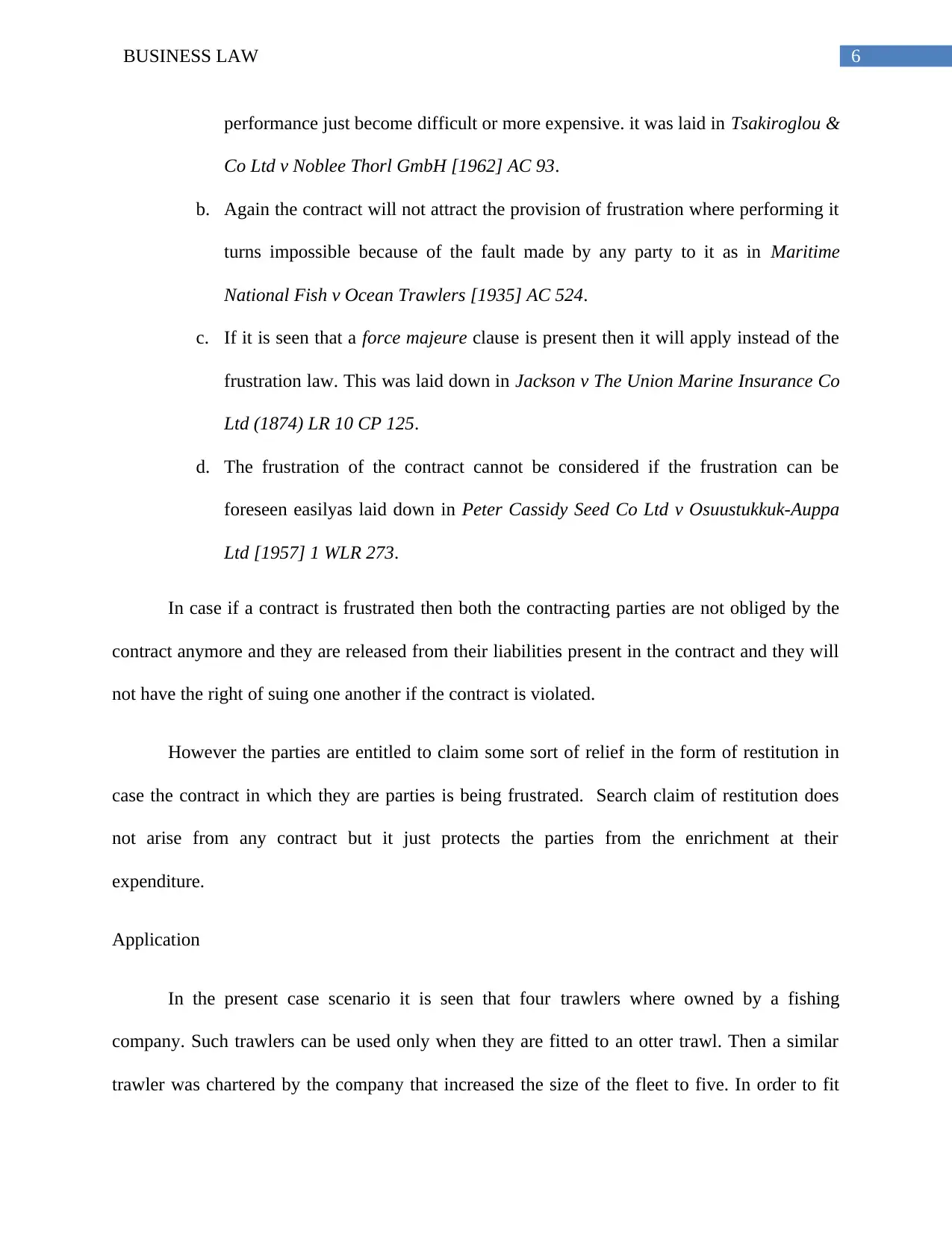
6BUSINESS LAW
performance just become difficult or more expensive. it was laid in Tsakiroglou &
Co Ltd v Noblee Thorl GmbH [1962] AC 93.
b. Again the contract will not attract the provision of frustration where performing it
turns impossible because of the fault made by any party to it as in Maritime
National Fish v Ocean Trawlers [1935] AC 524.
c. If it is seen that a force majeure clause is present then it will apply instead of the
frustration law. This was laid down in Jackson v The Union Marine Insurance Co
Ltd (1874) LR 10 CP 125.
d. The frustration of the contract cannot be considered if the frustration can be
foreseen easilyas laid down in Peter Cassidy Seed Co Ltd v Osuustukkuk-Auppa
Ltd [1957] 1 WLR 273.
In case if a contract is frustrated then both the contracting parties are not obliged by the
contract anymore and they are released from their liabilities present in the contract and they will
not have the right of suing one another if the contract is violated.
However the parties are entitled to claim some sort of relief in the form of restitution in
case the contract in which they are parties is being frustrated. Search claim of restitution does
not arise from any contract but it just protects the parties from the enrichment at their
expenditure.
Application
In the present case scenario it is seen that four trawlers where owned by a fishing
company. Such trawlers can be used only when they are fitted to an otter trawl. Then a similar
trawler was chartered by the company that increased the size of the fleet to five. In order to fit
performance just become difficult or more expensive. it was laid in Tsakiroglou &
Co Ltd v Noblee Thorl GmbH [1962] AC 93.
b. Again the contract will not attract the provision of frustration where performing it
turns impossible because of the fault made by any party to it as in Maritime
National Fish v Ocean Trawlers [1935] AC 524.
c. If it is seen that a force majeure clause is present then it will apply instead of the
frustration law. This was laid down in Jackson v The Union Marine Insurance Co
Ltd (1874) LR 10 CP 125.
d. The frustration of the contract cannot be considered if the frustration can be
foreseen easilyas laid down in Peter Cassidy Seed Co Ltd v Osuustukkuk-Auppa
Ltd [1957] 1 WLR 273.
In case if a contract is frustrated then both the contracting parties are not obliged by the
contract anymore and they are released from their liabilities present in the contract and they will
not have the right of suing one another if the contract is violated.
However the parties are entitled to claim some sort of relief in the form of restitution in
case the contract in which they are parties is being frustrated. Search claim of restitution does
not arise from any contract but it just protects the parties from the enrichment at their
expenditure.
Application
In the present case scenario it is seen that four trawlers where owned by a fishing
company. Such trawlers can be used only when they are fitted to an otter trawl. Then a similar
trawler was chartered by the company that increased the size of the fleet to five. In order to fit
Paraphrase This Document
Need a fresh take? Get an instant paraphrase of this document with our AI Paraphraser
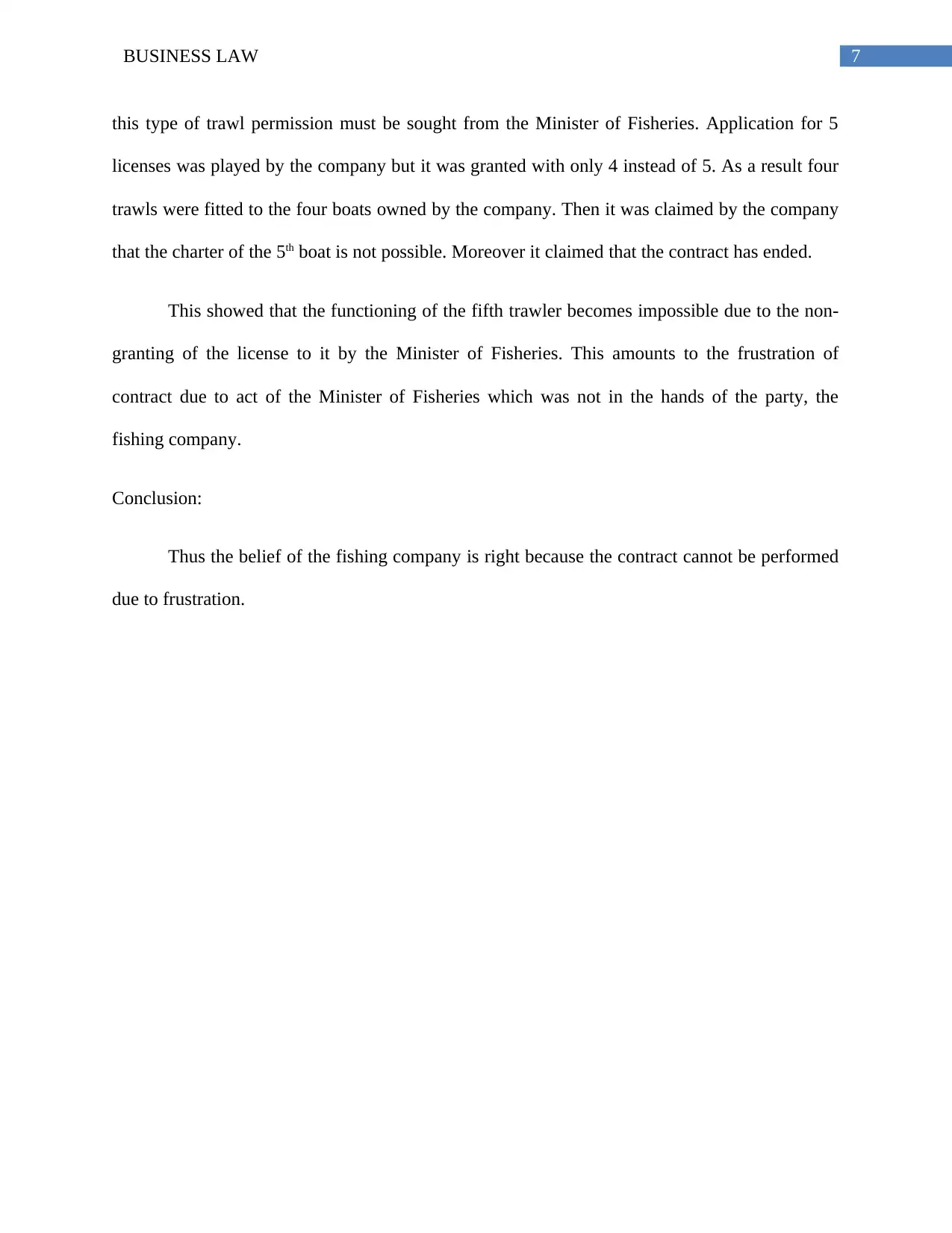
7BUSINESS LAW
this type of trawl permission must be sought from the Minister of Fisheries. Application for 5
licenses was played by the company but it was granted with only 4 instead of 5. As a result four
trawls were fitted to the four boats owned by the company. Then it was claimed by the company
that the charter of the 5th boat is not possible. Moreover it claimed that the contract has ended.
This showed that the functioning of the fifth trawler becomes impossible due to the non-
granting of the license to it by the Minister of Fisheries. This amounts to the frustration of
contract due to act of the Minister of Fisheries which was not in the hands of the party, the
fishing company.
Conclusion:
Thus the belief of the fishing company is right because the contract cannot be performed
due to frustration.
this type of trawl permission must be sought from the Minister of Fisheries. Application for 5
licenses was played by the company but it was granted with only 4 instead of 5. As a result four
trawls were fitted to the four boats owned by the company. Then it was claimed by the company
that the charter of the 5th boat is not possible. Moreover it claimed that the contract has ended.
This showed that the functioning of the fifth trawler becomes impossible due to the non-
granting of the license to it by the Minister of Fisheries. This amounts to the frustration of
contract due to act of the Minister of Fisheries which was not in the hands of the party, the
fishing company.
Conclusion:
Thus the belief of the fishing company is right because the contract cannot be performed
due to frustration.
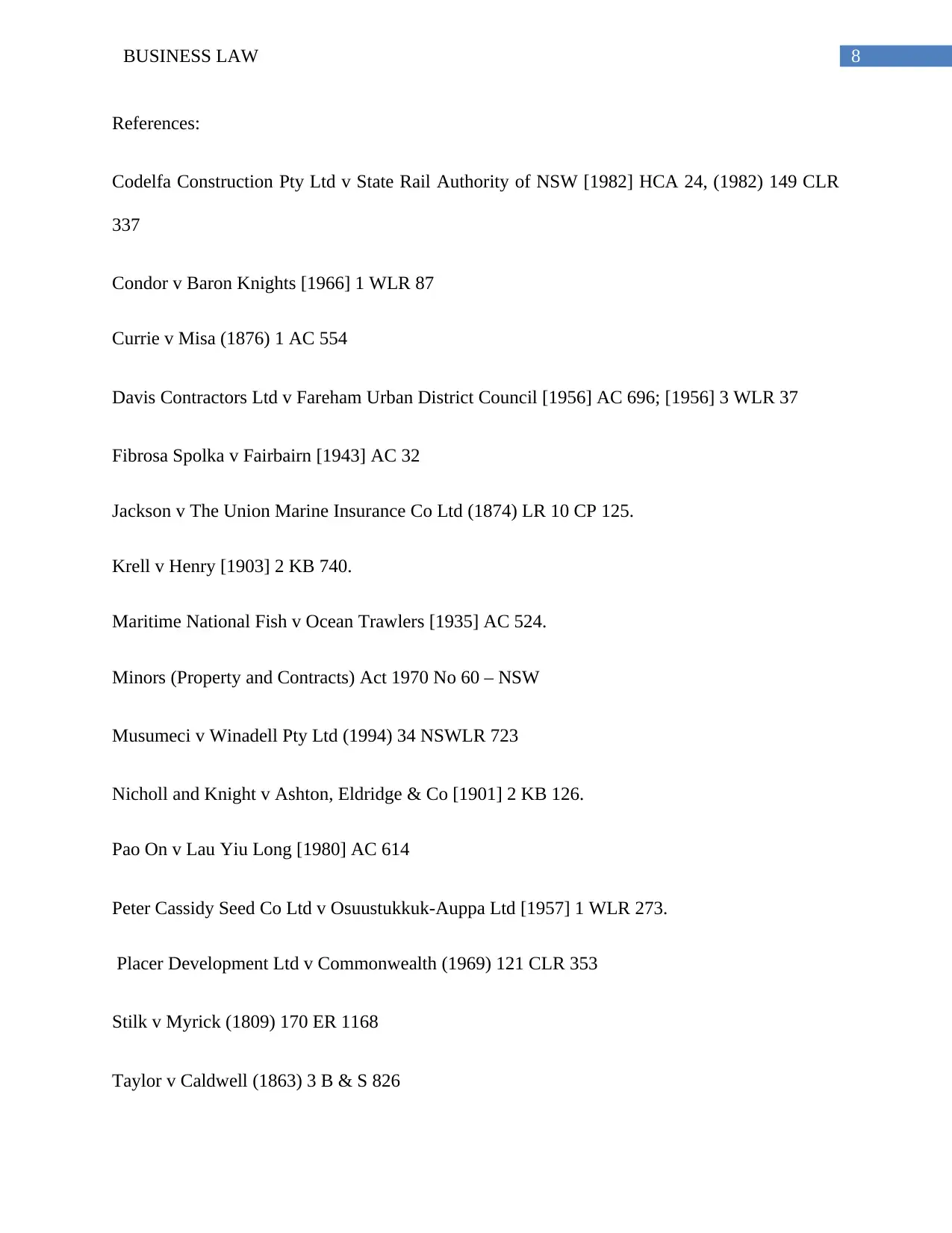
8BUSINESS LAW
References:
Codelfa Construction Pty Ltd v State Rail Authority of NSW [1982] HCA 24, (1982) 149 CLR
337
Condor v Baron Knights [1966] 1 WLR 87
Currie v Misa (1876) 1 AC 554
Davis Contractors Ltd v Fareham Urban District Council [1956] AC 696; [1956] 3 WLR 37
Fibrosa Spolka v Fairbairn [1943] AC 32
Jackson v The Union Marine Insurance Co Ltd (1874) LR 10 CP 125.
Krell v Henry [1903] 2 KB 740.
Maritime National Fish v Ocean Trawlers [1935] AC 524.
Minors (Property and Contracts) Act 1970 No 60 – NSW
Musumeci v Winadell Pty Ltd (1994) 34 NSWLR 723
Nicholl and Knight v Ashton, Eldridge & Co [1901] 2 KB 126.
Pao On v Lau Yiu Long [1980] AC 614
Peter Cassidy Seed Co Ltd v Osuustukkuk-Auppa Ltd [1957] 1 WLR 273.
Placer Development Ltd v Commonwealth (1969) 121 CLR 353
Stilk v Myrick (1809) 170 ER 1168
Taylor v Caldwell (1863) 3 B & S 826
References:
Codelfa Construction Pty Ltd v State Rail Authority of NSW [1982] HCA 24, (1982) 149 CLR
337
Condor v Baron Knights [1966] 1 WLR 87
Currie v Misa (1876) 1 AC 554
Davis Contractors Ltd v Fareham Urban District Council [1956] AC 696; [1956] 3 WLR 37
Fibrosa Spolka v Fairbairn [1943] AC 32
Jackson v The Union Marine Insurance Co Ltd (1874) LR 10 CP 125.
Krell v Henry [1903] 2 KB 740.
Maritime National Fish v Ocean Trawlers [1935] AC 524.
Minors (Property and Contracts) Act 1970 No 60 – NSW
Musumeci v Winadell Pty Ltd (1994) 34 NSWLR 723
Nicholl and Knight v Ashton, Eldridge & Co [1901] 2 KB 126.
Pao On v Lau Yiu Long [1980] AC 614
Peter Cassidy Seed Co Ltd v Osuustukkuk-Auppa Ltd [1957] 1 WLR 273.
Placer Development Ltd v Commonwealth (1969) 121 CLR 353
Stilk v Myrick (1809) 170 ER 1168
Taylor v Caldwell (1863) 3 B & S 826
⊘ This is a preview!⊘
Do you want full access?
Subscribe today to unlock all pages.

Trusted by 1+ million students worldwide

9BUSINESS LAW
Taylor v Caldwell [1863] EWHC QB J1.
Thomas v Thomas (1842) 114 ER 330
Tsakiroglou & Co Ltd v Noblee Thorl GmbH [1962] AC 93.
Taylor v Caldwell [1863] EWHC QB J1.
Thomas v Thomas (1842) 114 ER 330
Tsakiroglou & Co Ltd v Noblee Thorl GmbH [1962] AC 93.
1 out of 10
Related Documents
Your All-in-One AI-Powered Toolkit for Academic Success.
+13062052269
info@desklib.com
Available 24*7 on WhatsApp / Email
![[object Object]](/_next/static/media/star-bottom.7253800d.svg)
Unlock your academic potential
Copyright © 2020–2026 A2Z Services. All Rights Reserved. Developed and managed by ZUCOL.





